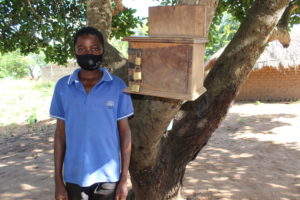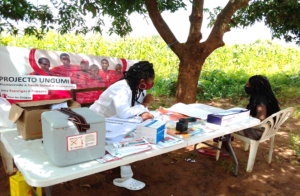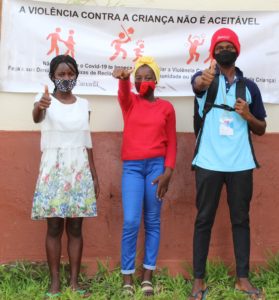Adolescent girls and boys in Mozambique learn how to advocate for their sexual and reproductive health and rights through the Ungumi project
 Nelton* is 16 and lives in Cumbabo village in Mozambique. When his father died, Nelton’s whole life changed. The house and agricultural field that he and his three siblings relied on was sold by his extended family members. Nelton tried various times to appeal to his family, to no avail. “When I heard that my father’s family members were selling our field, I was very sad, I didn’t know where I was going to get food for me and my brothers and sister,” he said.
Nelton* is 16 and lives in Cumbabo village in Mozambique. When his father died, Nelton’s whole life changed. The house and agricultural field that he and his three siblings relied on was sold by his extended family members. Nelton tried various times to appeal to his family, to no avail. “When I heard that my father’s family members were selling our field, I was very sad, I didn’t know where I was going to get food for me and my brothers and sister,” he said.
Nelton’s case ended up in the complaints box of the Community Protection Committee (CCP) of Cumbabo. From there, it was forwarded to law enforcement agencies who, fortunately, were able to return the land back to Nelton and his siblings. “I couldn’t believe that we were going to get our machamba [field] back, because they had already sold it. But I’m very happy because they gave it back to us, so we can plant rice and vegetables to eat and to sell.”
Across Mozambique, a large number of children and adolescents find themselves in vulnerable situations where they are denied their basic human rights. Poverty, harmful cultural practices and lack of access to information all play a role in the violation of their rights.
To help protect children, the Ungumi project, run by Save the Children Mozambique in partnership with the Government of Canada, has been working with communities in Mozambique to set up and train 43 Community Protection Committees (CCPs). The committees uphold children’s rights by raising community awareness of the importance of reporting cases of child rights violations. In each of the communities where a CCP has been established, complaint boxes have been installed for children and adults to report rights violations anonymously.
partnership with the Government of Canada, has been working with communities in Mozambique to set up and train 43 Community Protection Committees (CCPs). The committees uphold children’s rights by raising community awareness of the importance of reporting cases of child rights violations. In each of the communities where a CCP has been established, complaint boxes have been installed for children and adults to report rights violations anonymously.
António Cacoa, 35, is the CCP president in Cumbabo. He says that the group is very motivated to support the community’s children: “the children are the future for our community, and it is our responsibility to ensure that they grow well and are happy.”
He explains that when the complaints box was first introduced, some members of the community were hesitant. But thanks to the CCP’s awareness raising activities, they soon came to understand that the committee and the complaints box would benefit everyone.
“When the complaints box arrived, some people said that it would cause conflicts and divorces in the families, but after various awareness raising activities, the people understood that the box was there to help protect our children and maintain peace in our families.”
 The Ungumi project also supports children’s rights in Mozambique through Children’s Parliaments in Derre, Morrumbala and Milange districts. Here, children and young people receive training about different themes related to child rights, including advocacy and keeping the government accountable to children. The project aims to improve children’s knowledge, capacity and confidence so that they can become advocates for their own and others’ rights.
The Ungumi project also supports children’s rights in Mozambique through Children’s Parliaments in Derre, Morrumbala and Milange districts. Here, children and young people receive training about different themes related to child rights, including advocacy and keeping the government accountable to children. The project aims to improve children’s knowledge, capacity and confidence so that they can become advocates for their own and others’ rights.
Leila*, who is 12 years old and resident in Derre district, knew very little about what her rights were or how she could advocate for them. In 2019, she became part of the first group of members of the Derre Children’s Parliament. “I never imagined that one day I could be part of a Children’s Parliament. I am happy to have the opportunity to have a Children’s Parliament in the district so we can improve the rights of all children,” she said.
As a member of the Children’s Parliament, Leila received training on topics including child rights, adolescent sexual and reproductive health and rights, sexual and gender-based violence, and advocacy and lobbying. Thinking back on her experience so far, she said: “I have learned a lot about children’s rights, early pregnancies, child marriages and other things. I like the games, the teachings and the debates most.”
The Children’s Parliaments also implement awareness-raising activities with children, adolescents and adults in schools and communities across the 3 districts. Leila confirms that she feels proud of the work that she has done with other children in her district.
“I am proud and I feel happy when doing my work as I can teach other children who don’t know about their rights and responsibilities. I teach children to fight for their rights.”
The Ungumi project is financed by the Government of Canada and is implemented by Save the Children Mozambique in 43 communities and schools, and provides technical support for 19 adolescent and youth friendly services (SAAJs) in health facilities in Morrumbala, Milange and Derre districts, Zambézia province. The project aims to increase access to sexual and reproductive health and rights information and services for adolescents, in and out of school, that is gender-responsive and adolescent- friendly in order to help prevent adolescent pregnancies, child, early and forced marriages (CEFM), and sexual and gender-based violence (SGBV).
By: Emilia Chau, Program Manager


